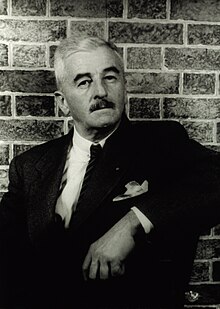
William Faulkner (1897—1962)[1] was an American writer who won the 1949 Nobel Prize in Literature. He is best known for his novels and short stories set in the fictional Yoknapatawpha County, a stand-in for his hometown of Oxford in Lafayette County, Mississippi.
Faulkner made his debut as a published writer at the age of 21 with the poem "L'Après-midi d'un Faune", which appeared in The New Republic on August 6, 1919. Two more poems, "Cathay" and "Sapphics" and a short story, "Landing in Luck", were published in Mississippian in November 1919.[2] Many of his earliest works as a student were published in other University of Mississippi publications. While living in New Orleans in 1925, Faulkner published over a dozen short stories in The Times-Picayune, often collectively known as the "New Orleans Sketches". To financially support himself, Faulkner was a prolific short story writer. His works commonly appeared in literary magazines like Scribner's and many were published posthumously. In addition to several speeches, Faulkner also wrote several essays on topics ranging from Albert Camus to Japan.
A year later in 1926, Faulkner's first novel Soldiers' Pay was published. His 19th and final, The Reivers, in 1962, the year he died. He was awarded a posthumous Pulitzer for the work.
- ^ "William Faulkner Is Dead in Mississippi Home Town; Faulkner is Dead in Oxford at 64". The New York Times. July 7, 1962. Archived from the original on January 1, 2023. Retrieved December 31, 2022.
- ^ Fargnoli, Golay & Hamblin 2008, p. 461.